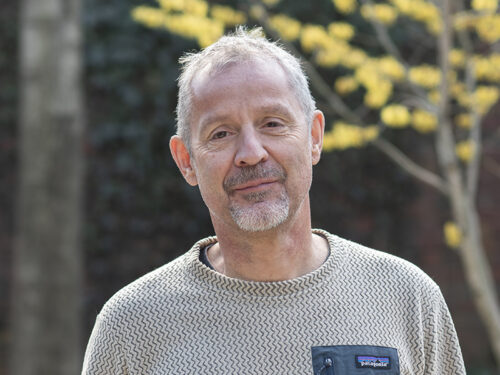Visiting fellow to study stability of renewables-heavy energy systems

Philippe Jacquod has joined the Andlinger Center for Energy and the Environment as a Gerhard R. Andlinger Visiting Fellow, bringing with him a unique background as a theoretical physicist working to ensure the stability and reliability of the power system in a renewables-dominated future.
Jacquod is a professor in the Department of Quantum Matter Physics at the University of Geneva and in the Institute of Sustainable Energy at the University of Applied Sciences and Arts, Western Switzerland. Despite his formal training as a fundamental physicist, Jacquod has dedicated the past decade to power systems research, focused on understanding how to maintain the dynamic stability of the power system as more intermittent energy sources, such as solar and wind, are added to the mix.
“It’s an exciting time for this type of research because the dynamics of the power grid are going to be completely changed by the increased penetration of new renewables,” said Jacquod. “They behave totally differently than standard power plants.”
Traditional energy sources that rely on spinning a turbine to generate electricity — whether that be coal, natural gas, hydroelectric power, or nuclear fission — exhibit considerable inertia, meaning that the turbines rotate at a relatively stable frequency and resist factors that slow down or speed up their rotation. This inertia stabilizes the grid, providing a buffer against any sudden changes in the supply or demand of energy.
Renewable energy sources like solar and wind lack such inertia, making an energy system with high levels of these energy sources potentially less resilient to grid fluctuations.
Collaborating with power electronics expert Minjie Chen, an associate professor of electrical and computer engineering and the Andlinger Center for Energy and the Environment, Jacquod will explore alternative control schemes for maintaining the stability and resilience of an energy system with high levels of renewable energy.
Most renewable energy sources rely on a technology known as an inverter, which converts the energy that a solar panel or wind turbine generates into a usable form for the grid. Almost all of today’s inverters are grid-following, meaning that they inject power at the same voltage and frequency as the grid and operate under the assumption that turbine-based energy sources will provide the necessary grid inertia.
Given the retirement of many turbine-based energy sources and the rise of renewables, an alternative class of inverters known as grid-forming inverters has become an increasingly important area of research. Grid-forming inverters can actively control voltage and frequency and help stabilize an electric grid system, essentially mimicking the inertia provided by spinning turbines.
Jacquod is interested in how grid-forming inverters and complementary energy technologies could underpin a future, renewables-driven electric grid. He is also interested in their potential role in supporting renewables-dominated microgrids.
“It’s a problem that requires you to think on an energy systems level, including about where and how much energy storage you might need to add to maintain a functional and resilient system,” Jacquod said. “And beyond the technical challenges, there are also economic and policy considerations — it’s a very vast and a very exciting problem.”
During his fellowship, Jacquod will also work with H. Vincent Poor, the Michael Henry Strater University Professor of Electrical and Computer Engineering, to investigate how to protect energy systems from unplanned threats such as hurricanes, which could become more severe as a consequence of climate change. This line of work could involve proactively identifying and planning necessary grid upgrades, as well as considering different ways to operate the grid in the face of novel environmental conditions.
“As a fellow, I’m excited to map out some well-defined research topics, learn from others in the Princeton community, and lay the foundations for projects that I hope will turn into long-lasting collaborations,” Jacquod said.
The Gerhard R. Andlinger Visiting Fellows program is designed to attract distinguished visitors who will collaborate with Andlinger Center faculty, researchers, and students, and enrich the research and teaching at the Andlinger Center.
Related articles:
- Former Princetonian returns as visiting fellow to study energy efficiency in historic buildings
- Gerhard R. Andlinger Visiting Fellow to tackle stability issues in high-performance solar cells
- Biotechnologist Sarah Glaven joins Andlinger Center as Gerhard R. Andlinger Visiting Fellow to scale sustainable biomanufacturing